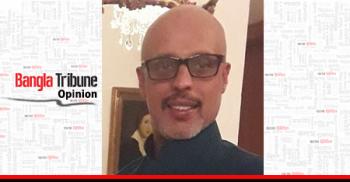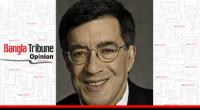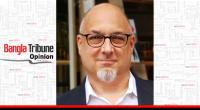 The World Ultra Wealth Report has confirmed what we have been witnessing for about a decade — the meteoric rise of a breed of suave, affluent rich Bangladeshis who are not only making money but are also living it up. No crime in enjoying your wealth, right?
The World Ultra Wealth Report has confirmed what we have been witnessing for about a decade — the meteoric rise of a breed of suave, affluent rich Bangladeshis who are not only making money but are also living it up. No crime in enjoying your wealth, right?
The report which made front page news in almost all local newspapers is a testament to a country’s fortitude in standing up to a mountain of odds from natural calamities to economic hardships to political upheaval and, confidently chalking out a place among other developing nations.
Countless times I have written in my articles, this Bangladesh is not the war-ravaged, economically crippled and psychologically scarred country of the 70s and 80s, trying desperately to shake off disparaging labels, like ‘bottomless basket’, ‘banana republic’ and ‘desperately poor’.
And, this is not the Bangladesh where we are made to believe that only foreigners can be wealthy and, being born a Bangladeshi, one is condemned within a cycle of suffering, self-denial and economic constraint.
The concept ‘we are poor’ is for the museum
Go back three decades and the social credo implanted in our minds at that time was, any white person is actually rich and afford all the luxuries in life while Bangladeshis are always impoverished.
Now there was a reason for such an idea to have found a firm place in our minds because the first two decades after liberation saw a country and its society struggling to get on their feet.
At that time, the idea of disposable income was unheard of; we bought clothes not because a certain new design caught our fancy but because the old clothes were too worn out to wear anymore.
It was standard practice to go to a cobbler to have a pair of shoes repaired three to four time before anyone considered the idea of buying a new one.
Clothes were handed down along with academic books plus other items of need like a watch or a pen.
The massive middle class in Bangladesh was a homogeneous lot with household income between Tk 10,000 and TK 15,000 at the most.
For an adult, out of university, there were three roads open: either try for a government job, which very few lucky ones got, open a small business, like a shop or a store, or go abroad.
At that time, with constraints at every step, we grew up thinking that only the best were possessed by people living abroad or by foreigners.
Add to this the damaging legacy of colonialism which planted in our psyche the feeling that certain races are superior and others are made to serve.
This imperial era policy of slowly injecting a sense of inferiority mixed with the post-independence environment of austerity spawned another damaging concept – Bangladeshis cannot be rich and comfort is only meant for others.
No hope in this country
In such a scenario, a common belief was, this country will always be stuck in a rut and the best option is to go abroad. Don’t get me wrong, I am not slating those who went and made a first world country their adopted home. However, in the first two decades, it was deemed a quality to have managed to get a visa to go and stay in the US.
This is exactly why, young people in droves went to the land of the stars and stripes in search of material comfort, which we had so far associated with foreigners or a foreign country only.
The line from many of my friends still ring in my ear: I will have a car, a home and a steady life.
A very attainable goal in modern-day Bangladesh for any university graduate, one would say!
While many went and found that golden dream, others decided to stay back and try their luck by being entrepreneurs. Today, Bangladesh can afford a wealthy debonair social section because of those who decided to take a challenge.
This country has seen a boom in entrepreneurship in the last 15 years with countless young people carving out a social niche and grabbing that ‘bling’ of comfortable living.
The word ‘wealthy’ in Bangladesh now conjures up shining BMWs or Jaguars, designer clothes, weekends at swanky upmarket restaurants, holidays overseas in some exotic resort and industries, which are worth millions in dollars, employing people across the country.
Once a Tk 300,000 car pulled people and the air-conditioned vehicle was akin to a princely chariot; today, the CNG driver is blasé while giving a scratch to a Tk 30 million Jaguar.
“Arey Bhai, Raastae Ektu Ghosha Lagboi” (Brother, a little grazing is no big issue on the road), will be their line to placate the Jaguar owner.
You may laugh, but in that line alone lies the core message of how Bangladesh has changed, in terms of economy, finance and social status.
The bus driver and the man in the BMW both smoke Benson and Hedges. Once, what one smoked was an indicator of that person’s social condition, with a stark social division created by the filter-tipped and non-filter-tipped cigarettes.
Affluent and living life to the full
This new breed of the wealthy has discarded the mantra of the old school rich people who hesitated in living a luxurious life as if prevented by some sense of guilt.
Now we have an educated class who are earning and showing no qualms in enjoying it and, honestly speaking, why should they? If you have made the money then you have every right to indulge a bit.
When a garment tycoon rides the best cars, sips exotic cocktails at plush hotels or becomes a sybarite during the weekend, there’s no reason to condemn him or her because they have made it to the top by their work topped with canny strategies.
For those whose industries employ thousands and make a vital contribution to the national industry, the tag ‘affluent’ is not pejorative; it’s something to wear with pride.
Being rich and Bangladeshi is the concept incorporated in the current day zeitgeist.
With a very ambitious middle class, who now aspire for flat-ownership, personal car (s), credit cards plus trips abroad, a new section has also emerged—the upper middle class.
People from this section often decide to start trailblazing business ventures, becoming new additions to the wealthy section in a matter of five years, thus expanding the affluent segment.
Meanwhile, the super-rich industrialists also find new avenues to grow, which means more employment. This penchant to grow bigger escalates them into the international sphere of wealth.
The percolating impact of a wealthy class
Many have often stated that there is a disparity in wealth because only one section becomes wealthy while others remain stuck in poverty.
Maybe such lines come from very blinkered attitudes because to be rich through legitimate ways, someone has to inject money in a venture which means a premise for employment. Once that enterprise flourishes, it expands, creating more jobs, not just at the labour level but also in top administrative posts.
Therefore, expansion of a local conglomerate means regular income for another segment — a virtuous cycle that makes one super-rich, others wealthy, a big section comfortable and a large number of people steady and secured.
In this Bangladesh, when one luxury car is ordered, someone else goes home with a regular sedan, another young dynamite gets his motorcycle keys while some others, seeing this trend, dares to hope.
Time to go abroad to make money is over; one can strike gold right here in Bangladesh.
Towheed Feroze is a News Editor at Bangla Tribune and teaches at the University of Dhaka.


